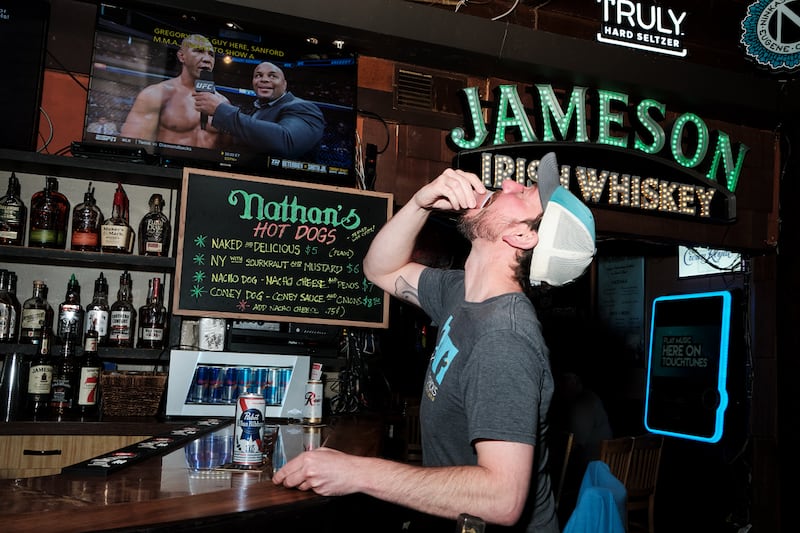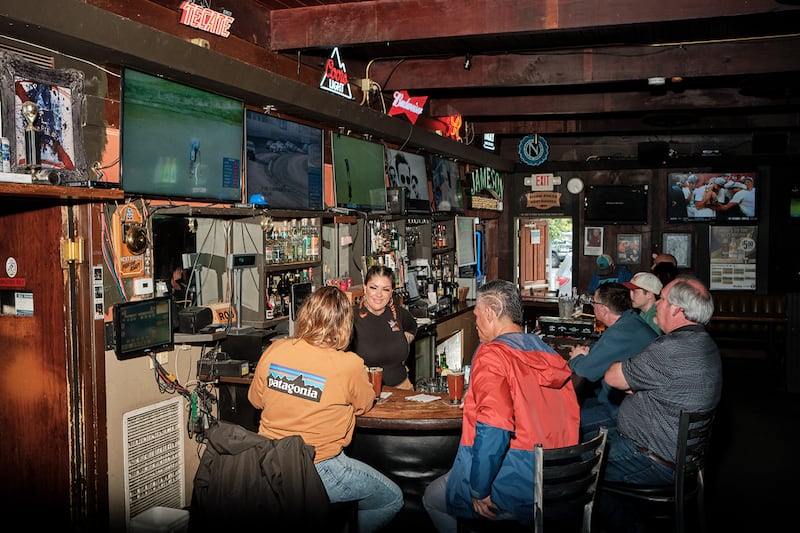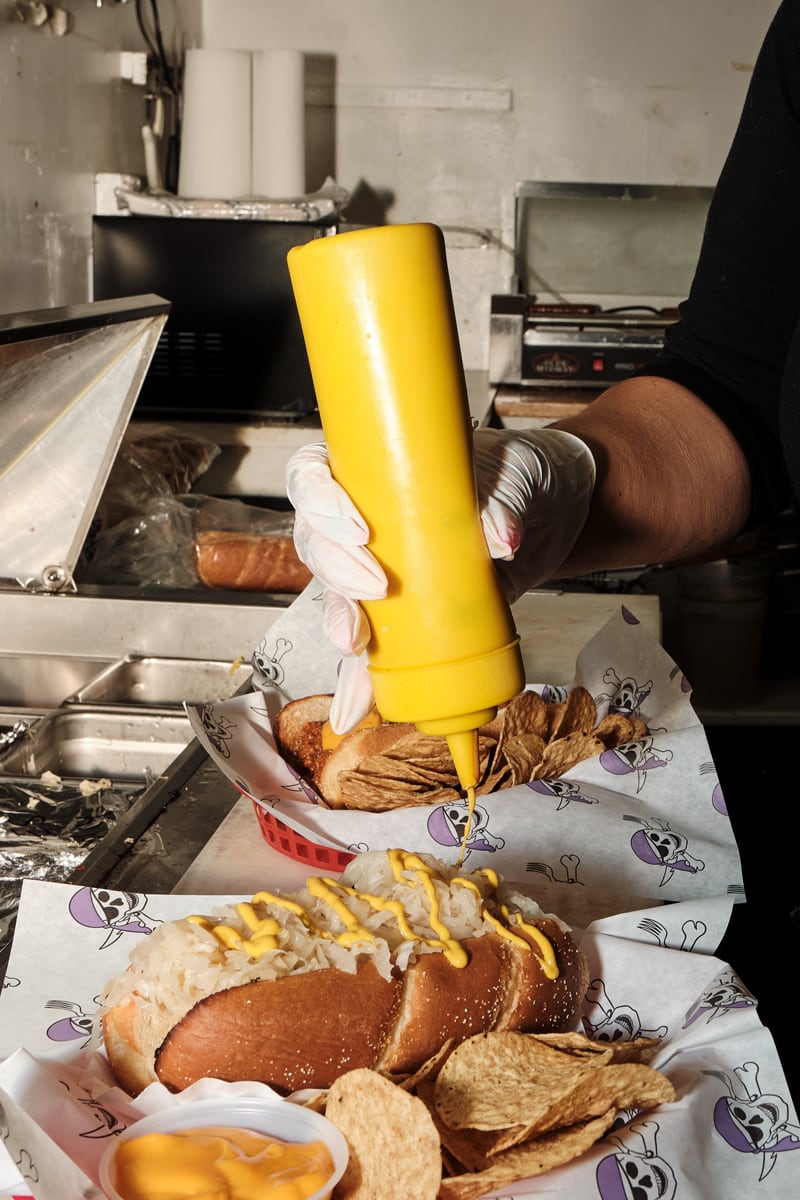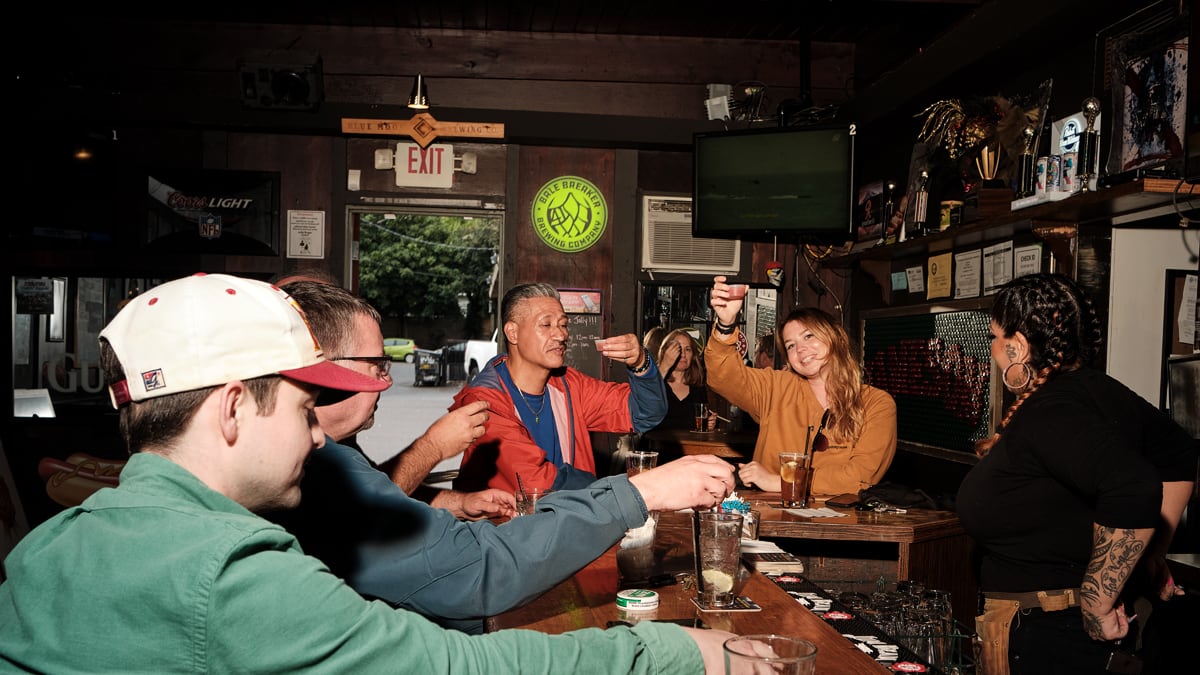Fittingly, perhaps, for an iconic establishment that’s lazily drifted about Southeast Portland for 60 years without ever attracting much notice, the Jolly Roger has announced a fateful last call, but all relevant information regarding the date of departure remains shrouded in mystery.
Rob Jackson, co-owner of the Jolly alongside wife Starr for the past 20 years, indicated a willingness late last year to amend their lease as needed in order to facilitate their landlord’s sale of the restaurant and bar’s long-standing location at 1340 SE 12th Ave. Soon afterward, the property was bought by developers whose plans for a five-story, 100-plus-unit residential complex await government approval, which leaves the business in a peculiar limbo.
“We got destroyed during all the conflicts,” Jackson says. “No matter how much we tried to fix the building, people kept hurting it, and the police were unavailable to help. That just helped us make the decision. We were supposed to be here another year, but we came to an agreement with the landlord that shortened our lease by one year so he could sell the building. At that point, we would’ve been done anyway.”
One Jolly bartender told WW last month that the bar would stay open until the 2023 Super Bowl. If forced to make a prediction, co-owner Jackson’s best guess was a New Year’s scuttling, but stressed the futility of groundless speculation.
“Everybody’s talking, but nothing has been decided yet,” Jackson insists. “The company that wants to put up the high-rise needs to get licensing for demolition beforehand. If the permits go through, they could call us tomorrow and start setting up a time for us to leave. As soon as they know, we’ll know, and then, giant parties every day.”

The circumstances surrounding the Jolly Roger’s fate also complicate the emotional response for a local citizenry predisposed to rail against the heavens whenever a landmark disappears.
Jackson was hardly forced out. This wasn’t the bar’s first location, after all, and its banner shall still fly across the river, where Jackson rebranded the former Stanich’s West as Jolly Roger at John’s Landing almost 15 years ago.
Admittedly, civic preservationists may have reason to worry about the Jolly’s truly irreplaceable feature. Jackson admits there’s no clear plan on what will become of the bar’s justly treasured signage—a majestic freestanding pylon sign shaped like a ship’s mast at a height no longer sanctioned—but it’s evaded the wrecking ball before.
“I don’t like to see any of these places go away,” Jackson says. “This building is so old and beat up that a redo would be crazy. I’m 60 years old, and we have two successful operations going right now. The building’s owner’s 76, and business-wise, he’s making the right choice. It’s time to cash out. We’ve been here for 20 years, we made a lot of friends, and it’s been an absolute blast. Unfortunately, time marches on.”
The Jolly Roger actually opened at the corner of Southeast 39th Avenue (now César E. Chávez Boulevard) and Powell Boulevard in 1962. Launched by Constantin “Guss” Dussin, favorite son of the restaurateurs behind downtown’s Virginia Cafe, initially marketed it as a themed eatery, and early advertisements depicted a peg-legged, pistol-toting buccaneer mascot atop the sign’s topsail promising “free chocolate pieces of eight for junior pirates finishing their plates.”
Don McGee, an older habitué of the current Jolly, recalls interiors drowning in nautical kitsch with booths designed to resemble miniature ships—arguable inspiration for the trolley car dining areas parked inside the founder’s next venture, the first Old Spaghetti Factory on Southwest 2nd Avenue and Pine Street. By 1970, Dussin had sold away his stake in the Jolly and Virginia Cafe to afford the skyrocketing costs of outfitting the Old Town warehouse with its Victorian-era décor. Though considered a bizarre gamble at the time, the Old Spaghetti Factory became the flagship of an empire with more than 40 outposts around the globe.
The Jolly Roger went a different path. Soldiering on as a downmarket fish-and-chips outlet, the family-friendly touches faded away. An adjoining Pirate’s Cove lounge was partitioned from the main dining room, and the business experimented with live music in the mid-’80s. At that point, the official record goes dark. Over the next decade, The Oregonian would mention the Jolly Roger just twice in a business story celebrating Old Spaghetti Factory’s new Japanese franchises and a Crime Stoppers story listing known locations of a recent stabbing suspect.
By the early ‘90s, when an incoming mini-mall forced the Jolly’s relocation to its current home, the original culinary ambitions of the enterprise had become so utterly irrelevant that the separate restaurant side felt like a vestigial limb. According to bartenders at the time, the retiring owner agreed to finally sell the business only under a contractual stipulation that the lounge remain undisturbed.
In 2002, Jackson snatched up the Jolly and, after a few years of steady growth, took full possession with Starr. The incoming regime brought in a sea of flat-screens along with NFL Sunday Ticket and NBA League Pass. They also tore down the wall once separating lounge from restaurant and turned the ever-vacant former dining area into a bustling video poker alcove. Tacos and sliders replaced chowder and shellfish, and most every remnant of the old swashbuckling memorabilia gave way to a beach-bar aesthetic.
The place does engender goodwill among a dizzying cross section of Portlanders, but for reasons difficult to articulate. While the signal attractions of other favored haunts immediately spring to mind—the staff, the crowds, an architectural quirk—patronage at the Jolly seems each time a decision based upon convenience and practicality. You don’t visit the Jolly in search of something you love unique to this particular bar. You largely go to avoid all of the qualities you hate.

Along the journey from a seafood restaurant whose clientele no longer ate to a neighborhood sports bar, the Jolly’s most salable feature (beyond that iconic signage) has been an easy adaptability to changing tastes and demographic shifts that would’ve crippled businesses more closely wed to a guiding vision.
“Madison’s restaurant across the street might have looked beautiful, but their parking lot was empty and ours was full,” Jackson laughs. “We didn’t try to change the world. We just wanted to play right to the people of the neighborhood—a little local church that believes in whatever you want. No regrets. It’s been wonderful being here. We have the most loyal customers you’ll ever see.”
Why, though? What makes the customers so loyal? Amanda, one of a handful of mismatched patrons happily day drinking alone during a recent visit, credited the location, but there’s a dozen watering holes nearby. The Jolly hasn’t the best food, cheapest drinks or prettiest décor. What, precisely, will be missed?
“Good memories, immediately, as soon as I walk in the door,” she says. “This is still where I’m most at home, even though I don’t really live around here anymore. It’s dark, you know? It feels a little more relaxed, more at peace. I guess…it feels like a bar.”
DRINK: Jolly Roger, 1340 SE 12th Ave., 503-232-8060, jollyrestaurants.com. Noon-midnight Monday-Thursday, noon-1 am Friday-Saturday, noon-11 pm Sunday.

